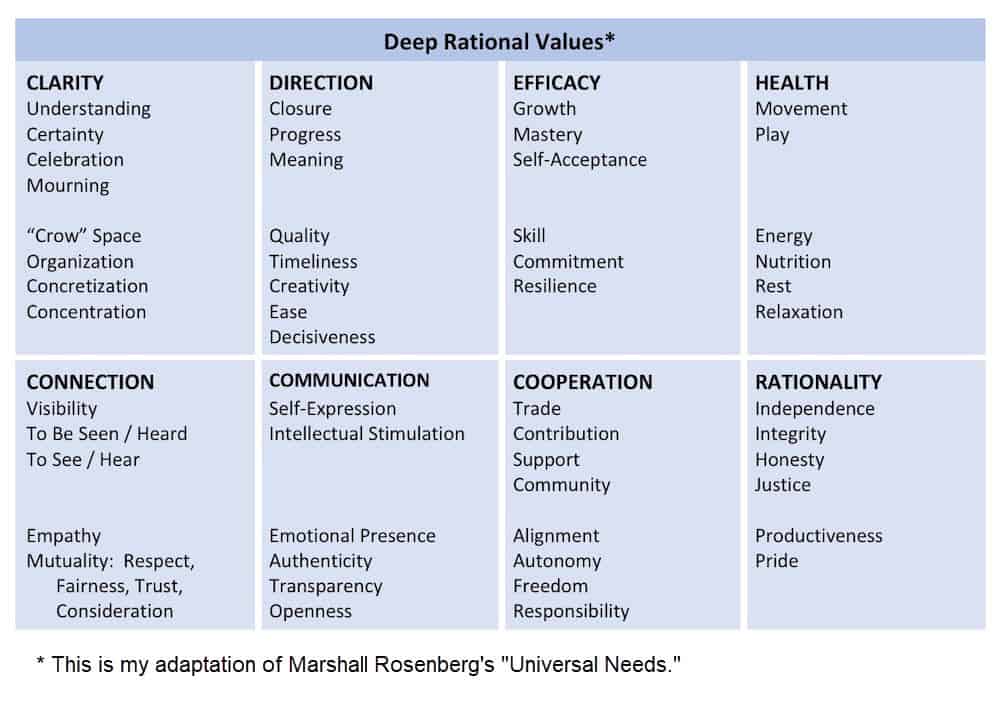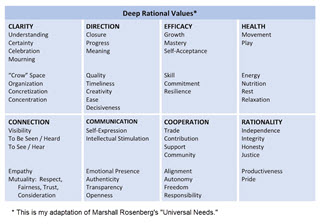In a call on “How to Get Results Now on Your Long-Term Objective,” I was asked whether I thought “should” should be eschewed. I don’t. I think “should” should be reclaimed. However, for many people, this will involve automatizing a new meaning for the word “should.”
“Should” is a moral concept. When you say you “should” do something, you are saying it is the moral thing to do. If you, as I, ascribe to the moral code of rational egoism, “I should” means:
Based on everything I know, including all of the values I hold most dear, plus my thoughtful observation of the present circumstances, the following action is in my best interest, and as a consequence, taking this action now rather than delaying or doing something else is the most likely option to leave me both satisfied at the end of today and happy over my lifetime.
I hope that my translation is inspiring. It embodies a moral theory based on the principle that your life is your top value, that life is sustained by creating values, that the function of your rational faculty is to figure out how to create values to sustain your life, and that happiness is a concomitant of a value-focused life.
That was a mouthful. As a matter of cognitive ease, we need to be able to sum up a moral perspective in one word. And we can. The word is “should.”
Unfortunately, many people have automatized a different meaning for the word “should.” Their “I should” means something like this:
Oh no! If I don’t take this action now, without delay, I am going to be insulted, shunned, or even worse: I will lose all respect for myself and prove I’m a terrible person who can’t be trusted and is no damn good.
In other words, the “should” comes from social threats and/or the expectation of self-recriminations.
This is a very common perspective, which inevitably triggers emotions of fear, anger, guilt, frustration, and/or self-doubt. No wonder some people wonder whether we should use the concept “should.”
But dropping “should” would compound the problem instead of solving it. “Should” is tied to your concept of morality and you need morality. In Ayn Rand’s words, morality is “a code of values to guide man’s choices and actions—the choices and actions that determine the purpose and the course of his life.”
To concretize “a code of values,” here is a table of the deep rational values that I use to guide my life (click on it to enlarge):

What does it mean to use values to guide your life? When you’re in a confusing situation, it means you identify a moral value to use as a beacon to find your way forward.
For example, if you’re having a conversation that’s going awry, you can seek to be authentic or to maintain your emotional presence. That will help. If you’re wanting better connection, you can work to really hear what the other person is saying or offer empathy. That will help.
If you are feeling you “should” do something but you don’t want to do it, you are in a confusing situation. Asking yourself why you “should” do it may reveal some threats or self-recriminations. But asking a few more whys to go deeper will get you to moral values. Once you get to values, everything is simpler.
For example, I recently got tied up in “shoulds” preparing slides for a presentation. Somehow, the way in which I did the slides became a test of whether I was a good communicator and a good person. I was thinking I “should” do the slides a certain way, or else I was no good.
But by asking why I needed to do the slides and why I thought I should do them a certain way, it quickly became clear that the top value at stake was clarity. And once I saw how important clarity was, I could turn my attention away from unproductive, self-absorbed criticisms and to what would make the presentation clear. I just needed to assemble a few diagrams I already had plus make one new two-minute video. Once I was able to focus on values, I could do what was in fact in my best interest in that moment.
I did this, not by throwing out “should,” but by remembering that if there is any shred of truth to a “should” statement, it is attempting to help me to live a better life. So it’s worth taking a minute to look to see: how could my code of values guide me in this moment?
* * *
Note: The table above is included as part of the Emotions and Values Summary Sheet in the Thinking Directions Starter Kit and is discussed in the recording “Emotions and Values 101.”
I adapted my list from the list of “Universal Needs” that Marshall Rosenberg developed. If you do a web search on “universal needs,” you will get many other people’s lists. If your moral code is designed to help you flourish here on earth, you will find much overlap between my list, other lists, and your own list. Indeed, I encourage you to make your own list of these concepts. Knowing your list of deep rational values can help you to reclaim “should” when it shows up with a threat-based context. You translate threats and recriminations into values by asking, “Why?” again and again until you get to the life-serving values at stake in the situation.








0 Comments